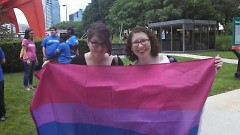June is pride month, a seemingly happy time where queer people celebrate their identities and lives. Ideally, it is a time to remember our history and create our future. Unfortunately, my experiences with pride-related events in West Michigan has left me to create my own humble form of pride celebrating the wonderful queer people I know by quiet coffee shop meetings and queer movie marathons.
I realized I was bi sometime in my high school education at Kenowa Hills, but it was subconsciously buried away as I saw the very few out people at my school bullied, mocked, and hated by students and staff. There were only two students in my entire school that I knew identified as bisexual, and the way people talked so harshly about them scared me. I didn’t want to be something that others found disgusting.
However, late in my senior year I came out to my best friend and highschool boyfriend. While she took it in stride, my boyfriend did not. At first he was upset, seeing it as a comment on his masculinity. A month or so later that confusion and anger turned into not-so-funny jokes and the sexualization (to make someone a sexual object of desire without their consent) of my identity. This theme of anger, invalidation, and sexualization set the stage for my experiences as a bi woman in West Michigan.
My optimism at finding an accepting LGBTQ community died down within the first month of school. Straight allies got more attention than I did at group events, there was a depressing lack of media/resources on bisexuality, and my attempts to make new friends often failed. I would meet friendly bi people here and there, but it seemed that leadership roles in the community at GVSU and Grand Rapids largely belonged to gay or straight people.
I’ll never forget the first and only frat party I attended my freshman year where a guy physically pushed my friend and me together because he wanted to see us make out. The majority of my experiences with sexual harassment and rape are affected by how my bi identity and feminine gender presentation intersects with misogyny. I was raped during my time at GV, ironically also in the month of June, which furthered my isolation, self-harm, and self-medication. As a small bright spot, I was the keynote speaker at Lavender Graduation, a ceremony for LGBTQ graduates.
Somehow, I still clung to my label as bi, finding comfort in the small online community on Tumblr. I’d come home from a terrible day and only be able to find people I related to online. I created the Grand Rapids Nonmonosexual Alliance, which still meets once in a while. Even though that group is exceedingly small, I was able to meet some amazing bi people in my town who I’m still close to today. I’m now able to articulate and claim ownership over my identity. However, it’s still makes my gut twist painfully when I speak about how bi women are at a very high risk of sexual assault, suicide, and alcohol abuse. I know how true those statistics are for myself and my friends, yet there is an incredible amount of denial and pushback. Coverage of bi hate crimes and suicide is low, and it’s still very difficult to find resources and acceptance as young adult. There are few bi-specifics groups/programming and little to no funding for the ones that do exist.
People love to talk about how bisexuality is outdated or that we should get rid of labels all together. Sadly, this is still happening in both straight and queer circles. Instead of letting people own their labels and celebrating all people who are attracted to more than one gender, I find
myself constantly having to defend my label. Bisexuality isn’t just being half-gay and half-straight. Instead it’s this wonderful complex space all it’s own. Being bi simply means that you are attracted to more than one gender, and any specifics is up to the person themselves to define. Any like any other sexuality, people with other gender, racial, ability, class, etc, identities can and do identify as bi.
While I have been discouraged by the gay-or-straight attitude that still pervades West Michigan, I am so proud of my fellow bi people. So you probably won’t find me at any “beer city” pride events, especially alone. If I am there, you’ll see me with my bi friends wrapped in our bi flags with glee (and a little nervousness). Bi people reaching out to each other is powerful and needed. It’s difficult to be out publicly in the face of a well-founded fear of being hurt physically, sexually, and/or emotionally. This isn’t just true for bi people, but for the People of Color, disabled, trans, and/or genderqueer members of the queer community who are marginalized, that is, made to feel lesser than.. (The irony of having such a fear at pride events is telling.) I challenge my communities to change, to fight against that swelling in your gut that says that I’m overreacting or creating unneeded dissention. While I’m not here for the booze and heteronormativity (the idea that heterosexuality is the standard, and that queer relationships are more valid if they mirror heterosexual relationships), I am here for my community. And please, when I’m walking down the street, whether at Pride or at an art fair, don’t assume my sexuality based on who’s hand I’m holding.
The Rapidian, a program of the 501(c)3 nonprofit Community Media Center, relies on the community’s support to help cover the cost of training reporters and publishing content.
We need your help.
If each of our readers and content creators who values this community platform help support its creation and maintenance, The Rapidian can continue to educate and facilitate a conversation around issues for years to come.
Please support The Rapidian and make a contribution today.
